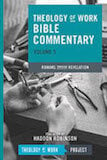Best of Daily Reflections: Full Christianity: Doing, Thinking, and Being, Part 6
Daily Reflection / Produced by The High Calling
So I tell you this, and insist on it in the Lord, that you must no longer live as the Gentiles do, in the futility of their thinking.
Ephesians 4:17
So far in our close reading of Ephesians 4:17, we have seen that full Christianity is a matter of doing and thinking. Today, we'll add being to the list. Christian faith not only shows us how to live and teaches us how to think. It also tells us who we are.
If I were to ask you who you are, how would you answer? You might start with your regional identity (I'm a Texan) or your job (I'm a lawyer). You might tell me your religious affiliation (I'm a Baptist) or ethnic background (I'm Italian). You'd probably mention your role in your family (I'm a wife and a mother) or perhaps the fact that you're single. If we met far away from home, you'd probably identify yourself by your nationality (Soy de México) or with reference to the major city where you live (I'm a New Yorker.) If you live in Texas, you might very well tell me what football team you root for ("Gig 'em" or "Hook 'em horns").
Jews in the first century A.D. saw themselves most of all in terms of their ethnic, religious, and national heritage. They were Jews, fundamentally. Their Jewishness made them distinctive from all others. Everyone else was a Gentile, a non-Jew by definition. The categories of Jew and Gentile defined Jewish self-understanding and experience, especially for those Jews who lived outside of Israel.
From this perspective, the recipients of Ephesians were Gentiles, as Paul had identified them in previous chapters (2:11, 3:1). Though there may have been a few Jews among the recipients of this letter, the majority were not Jewish. Thus, we would expect Paul, as a Jewish man, to identify them as Gentiles, and that's what we find in the opening chapters of Ephesians.
But then we come upon Ephesians 4:17. Here, Paul writes, "So I tell you this, and insist on it in the Lord, that you must no longer live as the Gentiles do . . . ." Wait a minute. Aren't the recipients of this letter still Gentiles, though now of a Christian variety? Not exactly. Paul speaks to them as if they were set apart from the Gentiles. Yet, they did not become Jews when they received the good news of God's grace in Christ. According to the traditional Jew/Gentile schema, they remained Gentiles. However, Paul's language in verse 17 implies that they are not really Gentiles anymore. It's as if the formerly Gentile believers have become an altogether new thing, like a third race, different from Jews and Gentiles. (See also 1 Cor. 10:32, 12:2, Gal. 3:28, Col. 3:11).
The assumption behind Ephesians 4:17 is that becoming a Christian involves a fundamental change in one's identity, in one's way of being in the world. Once you have received God's grace through Christ, you are not the same person anymore. You are newly created by God through Christ to be someone altogether new. So, though you will still adopt the many labels assigned by your culture, you will still be a Texan or a Baptist or a mother and so on, your fundamental identity will be defined by your relationship with God through Christ. You will be a saint, set apart by God for him and his purposes. You will be a beloved son or daughter of God the Father and therefore a brother or sister in God's family. You will be a Christian, one whose life is characterized most of all by Jesus Christ, your Savior, Lord, teacher, model, and friend.
FOR REFLECTION: So, prior to reading this reflection, if you were asked who you are, how would you have answered? To what extent does your relationship with God through Christ define who you are? Do you see yourself as a Christian most of all? If so, why? If not, why not? What other identities compete for first place in your sense of self?
PRAYER: Gracious God, thank you for choosing me as your own. Thank you for making me your beloved child, your servant, your coworker in your redemptive and restorative work. Thank you that I am a Christian, one who has been saved into relationship with you through Christ.
As you know, Lord, there is so much in this world that seeks to define me, to tell me who I am. Help me, I pray, to know myself most of all as you know me. Help me to be the person you have created and re-created me to be. May my identity in you take precedence over all others. Amen.






